欧盟香蕉案
- 格式:ppt
- 大小:876.00 KB
- 文档页数:30
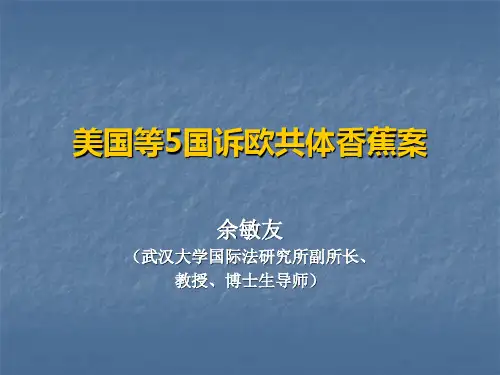
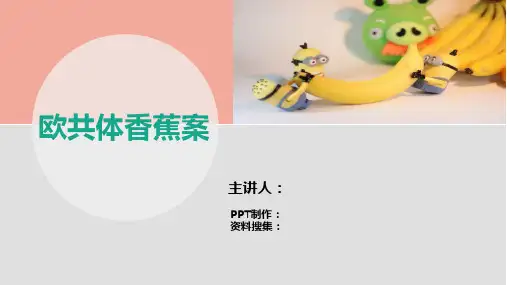
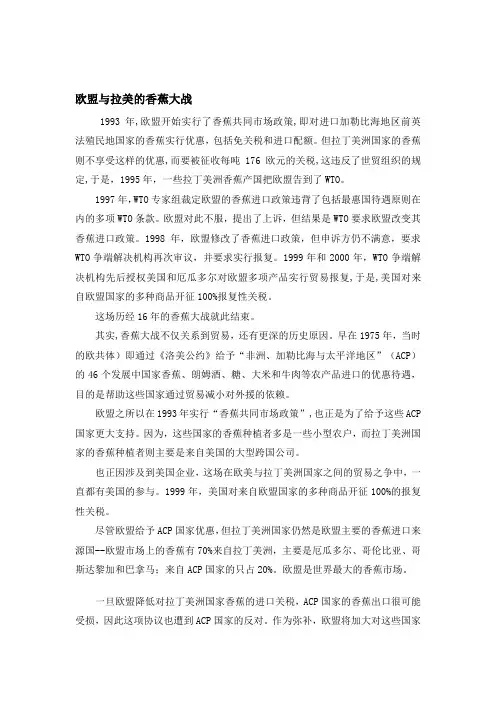
欧盟与拉美的香蕉大战1993年,欧盟开始实行了香蕉共同市场政策,即对进口加勒比海地区前英法殖民地国家的香蕉实行优惠,包括免关税和进口配额。
但拉丁美洲国家的香蕉则不享受这样的优惠,而要被征收每吨176欧元的关税,这违反了世贸组织的规定,于是,1995年,一些拉丁美洲香蕉产国把欧盟告到了WTO。
1997年,WTO专家组裁定欧盟的香蕉进口政策违背了包括最惠国待遇原则在内的多项WTO条款。
欧盟对此不服,提出了上诉,但结果是WTO要求欧盟改变其香蕉进口政策。
1998年,欧盟修改了香蕉进口政策,但申诉方仍不满意,要求WTO争端解决机构再次审议,并要求实行报复。
1999年和2000年,WTO争端解决机构先后授权美国和厄瓜多尔对欧盟多项产品实行贸易报复,于是,美国对来自欧盟国家的多种商品开征100%报复性关税。
这场历经16年的香蕉大战就此结束。
其实,香蕉大战不仅关系到贸易,还有更深的历史原因。
早在1975年,当时的欧共体)即通过《洛美公约》给予“非洲、加勒比海与太平洋地区”(ACP)的46个发展中国家香蕉、朗姆酒、糖、大米和牛肉等农产品进口的优惠待遇,目的是帮助这些国家通过贸易减小对外援的依赖。
欧盟之所以在1993年实行“香蕉共同市场政策”,也正是为了给予这些ACP 国家更大支持。
因为,这些国家的香蕉种植者多是一些小型农户,而拉丁美洲国家的香蕉种植者则主要是来自美国的大型跨国公司。
也正因涉及到美国企业,这场在欧美与拉丁美洲国家之间的贸易之争中,一直都有美国的参与。
1999年,美国对来自欧盟国家的多种商品开征100%的报复性关税。
尽管欧盟给予ACP国家优惠,但拉丁美洲国家仍然是欧盟主要的香蕉进口来源国--欧盟市场上的香蕉有70%来自拉丁美洲,主要是厄瓜多尔、哥伦比亚、哥斯达黎加和巴拿马;来自ACP国家的只占20%。
欧盟是世界最大的香蕉市场。
一旦欧盟降低对拉丁美洲国家香蕉的进口关税,ACP国家的香蕉出口很可能受损,因此这项协议也遭到ACP国家的反对。
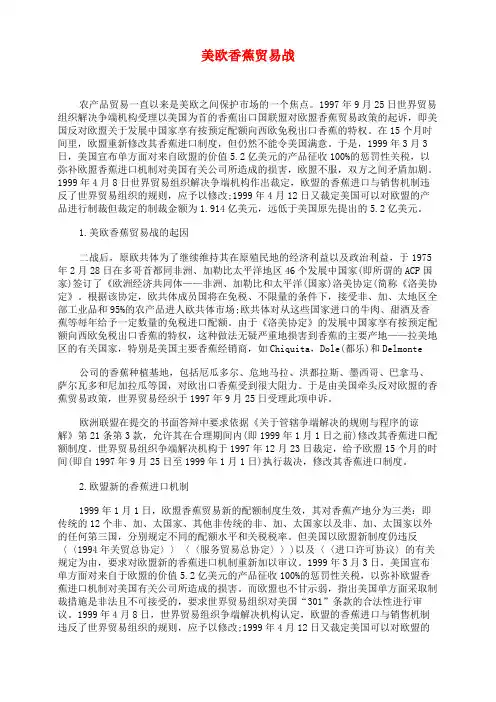
美欧香蕉贸易战农产品贸易一直以来是美欧之间保护市场的一个焦点。
1997年9月25日世界贸易组织解决争端机构受理以美国为首的香蕉出口国联盟对欧盟香蕉贸易政策的起诉,即美国反对欧盟关于发展中国家享有按预定配额向西欧免税出口香蕉的特权。
在15个月时间里,欧盟重新修改其香蕉进口制度,但仍然不能令美国满意。
于是,1999年3月3日,美国宣布单方面对来自欧盟的价值5.2亿美元的产品征收100%的惩罚性关税,以弥补欧盟香蕉进口机制对美国有关公司所造成的损害,欧盟不服,双方之间矛盾加剧。
1999年4月8日世界贸易组织解决争端机构作出裁定,欧盟的香蕉进口与销售机制违反了世界贸易组织的规则,应予以修改;1999年4月12日又裁定美国可以对欧盟的产品进行制裁但裁定的制裁金额为1.914亿美元,远低于美国原先提出的5.2亿美元。
1.美欧香蕉贸易战的起因二战后,原欧共体为了继续维持其在原殖民地的经济利益以及政治利益,于1975年2月28日在多哥首都同非洲、加勒比太平洋地区46个发展中国家(即所谓的ACP国家)签订了《欧洲经济共同体——非洲、加勒比和太平洋(国家)洛美协定(简称《洛美协定》。
根据该协定,欧共体成员国将在免税、不限量的条件下,接受非、加、太地区全部工业品和95%的农产品进人欧共体市场;欧共体对从这些国家进口的牛肉、甜酒及香蕉等每年给予一定数量的免税进口配额。
由于《洛美协定》的发展中国家享有按预定配额向西欧免税出口香蕉的特权,这种做法无疑严重地损害到香蕉的主要产地——拉美地区的有关国家,特别是美国主要香蕉经销商,如Chiquita,Dole(都乐)和Delmonte公司的香蕉种植基地,包括厄瓜多尔、危地马拉、洪都拉斯、墨西哥、巴拿马、萨尔瓦多和尼加拉瓜等国,对欧出口香蕉受到很大阻力。
于是由美国牵头反对欧盟的香蕉贸易政策,世界贸易经织于1997年9月25日受理此项申诉。
欧洲联盟在提交的书面答辩中要求依据《关于管辖争端解决的规则与程序的谅解》第21条第3款,允许其在合理期间内(即1999年1月1日之前)修改其香蕉进口配额制度。
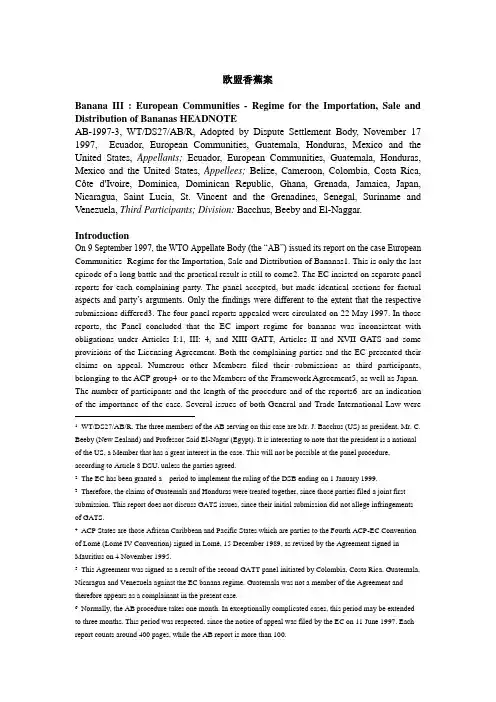
欧盟香蕉案Banana III : European Communities - Regime for the Importation, Sale and Distribution of Bananas HEADNOTEAB-1997-3, WT/DS27/AB/R, Adopted by Dispute Settlement Body, November 17 1997, Ecuador, European Communities, Guatemala, Honduras, Mexico and the United States, Appellants; Ecuador, European Communities, Guatemala, Honduras, Mexico and the United States, Appellees; Belize, Cameroon, Colombia, Costa Rica, Côte d'Ivoire, Dominica, Dominican Republic, Ghana, Grenada, Jamaica, Japan, Nicaragua, Saint Lucia, St. Vincent and the Grenadines, Senegal, Suriname and V enezuela, Third Participants; Division: Bacchus, Beeby and El-Naggar. IntroductionOn 9 September 1997, the WTO Appellate Body (the “AB”) issued its report on the case European Communities- Regime for the Importation, Sale and Distribution of Bananas1. This is only the last episode of a long battle and the practical result is still to come2. The EC insisted on separate panel reports for each complaining party. The panel accepted, but made identical sections for factual aspects and party’s arguments. Only the findings were different to the extent that the respective submissions differed3. The four panel reports appealed were circulated on 22 May 1997. In those reports, the Panel concluded that the EC import regime for bananas was inconsistent with obligations under Articles I:1, III: 4, and XIII GATT, Articles II and XVII GATS and some provisions of the Licensing Agreement. Both the complaining parties and the EC presented their claims on appeal. Numerous other Members filed their submissions as third participants, belonging to the ACP group4 or to the Members of the Framework Agreement5, as well as Japan. The number of participants and the length of the procedure and of the reports6 are an indication of the importance of the case. Several issues of both General and Trade International Law were1WT/DS27/AB/R. The three members of the AB serving on this case are Mr. J. Bacchus (US) as president, Mr. C. Beeby (New Zealand) and Professor Said El-Nagar (Egypt). It is interesting to note that the president is a national of the US, a Member that has a great interest in the case. This will not be possible at the panel procedure, according to Article 8 DSU, unless the parties agreed.2The EC has been granted a period to implement the ruling of the DSB ending on 1 January 1999.3Therefore, the claims of Guatemala and Honduras were treated together, since those parties filed a joint first submission. This report does not discuss GATS issues, since their initial submission did not allege infringementsof GATS.4ACP States are those African Caribbean and Pacific States which are parties to the Fourth ACP-EC Convention of Lomé (Lomé IV Convention) signed in Lomé, 15 December 1989, as revised by the Agreement signed in Mauritius on 4 November 1995.5This Agreement was signed as a result of the second GATT panel initiated by Colombia, Costa Rica, Guatemala, Nicaragua and Venezuela against the EC banana regime. Guatemala was not a member of the Agreement and therefore appears as a complainant in the present case.6Normally, the AB procedure takes one month. In exceptionally complicated cases, this period may be extended to three months. This period was respected, since the notice of appeal was filed by the EC on 11 June 1997. Each report counts around 400 pages, while the AB report is more than 100.examined and given innovative solutions. The AB is building on the WTO provisions to play its institutional role. The rulings of this initial period furnish the fundamental orientation and principles for the future functioning of the dispute settlement of the Organisation. The analysis is therefore separated in two parts, one relating to the issues of importance for International Law and the second one dealing with International Trade rules.ConclusionsAs a result of the AB it has been confirmed that main aspects of the EC import regime for bananas is inconsistent with WTO rules. The EC will be faced with the obligation of implementing the AB Report, while complying with its commitments under the LoméConvention, namely, giving traditional imports of ACP bananas treatment not less favourable than in the past. This ruling will also encourage the EC to negotiate the next Lomé Convention in a manner which will conform with WTO obligations, according to the different possibilities foreseen by the European Commission in its Green Paper7.The EC regime as it stands today is inconsistent with non-discrimination obligations both under GA TT and under GATS, since it favours imports coming from some regions (EC, DOM and ACP countries and those parties to the Framework Agreement on Bananas) to the expense of other exporting countries. The Commission has proposed the following modifications: To maintain the present tariff quota for non-traditional ACP and third country bananas at 2.2 million tonnes at a duty of 75 ECU/tonne (in stead of 100 ECU/tonne). Additionally, a supplementary quota of 353.000 tonnes at a duty of 300 ECU/tonne would be established to take account of the enlargement.The current licensing system would be dismantled by abolishing Category B licenses and export certificates for FAB countries. This will alter the market conditions. The existing licences are designed to allow cross-subsidies between }mporters of dollar bananas and those of traditional ACP and EC bananas, which are less efficient. To compensate the foreseeable income loss for ACP bananas, the Commission proposes a system of technical and financial assistance, defined for each ACP country8. Another effect is to abolish the FAB modifications to the EC Regime. As before those modifications, all Latin American bananas will be treated in the same way, with the difference that they will not be disadvantaged with respect to ACP bananas. Some of the features of the current system, which do not conflict with WTO obligations, such as the existence of tariff quotas, will be maintained.The overall impact of the reform should benefit the European consumers. Dollar bananas will be available at a lower price and this will influence their choices. ACP bananas will still be accessible, since the quota for traditional imports will probably be maintained, at least until the next Loménegotiation. EC bananas will also maintain their quota.Concerning the operators in the European market, those who are benefiting of Category B licenses are going to loose their quota rent. Since most of them are European based companies, the European operators are the most harmed by this AB ruling. On the contrary, those operators traditionally importing dollar bananas, mainly big transnational companies, will benefit from an7Green Paper on relations between the European Union and the ACP countries on the eve of the 21st century, European Commission, 1997. (http://europa.eu.int)8The use of a system of production subsidies had already been pointed out by the doctrine to minimise the distortionary impact of the internal banana market. See READ R. “The EC Banana Market: The Issues and the Dilemma”, The World Economy, 2(1994), 219-235, at 234.additional income due to the lower import tariff.It remains to be seen whether the producers in the developing countries of the tropical areas will really gain from the reform to be undertaken or if the profit will stay in the trading companies.It is widely acknowledged that the current WTO dispute settlement has moved towards a more rule-oriented system9. The Report in this case contains several innovative conclusions which have a meaning in the definition of the institutional role of the AB. The possibility for private lawyers to represent a Member’s delegation in the AB hearing represents some openness of a purely intergovernmental system. Private lawyers may give a more legally oriented reasoning than government officials. Furthermore, the way in which the AB modifies the reasoning of the Panel in certain points such as the interpretation of the Japan-Alcoholic Beverages case10 reveals a concern for clarity of the legal reasoning, towards a more predictable system. The call for a system of preliminary rulings goes certainly in the same direction. Their impact would depend much on whether they would be admitted as authoritative interpretation or not11.The AB is building up its own identity. As a young institution, it has to provide in its early rulings with principles and guidance that will probably be followed in the future. As in other Reports12, the AB is contributing to the consolidation of the rule of law in the field of international trade.9See YOUNG, M. “Dispute resolution in the Uruguay Round: Lawyers triumph over diplomats”, The International Lawyer, 2(1995) 29 389-409 and MONTAÑÀ I MORA, “A GATT with teeth: Law wins over politics in the resolution of international trade disputes”, 31 Columbia Journal of Transnational Law, 103 (1993), 128-136.10See supra note 错误!未定义书签。
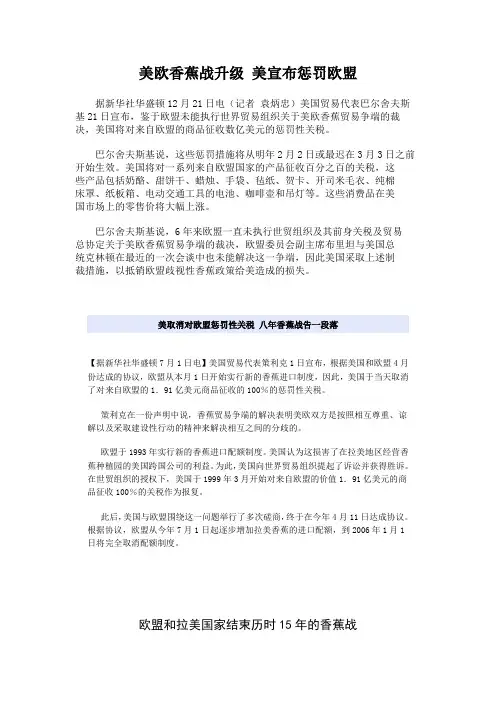
美欧香蕉战升级美宣布惩罚欧盟据新华社华盛顿12月21日电(记者袁炳忠)美国贸易代表巴尔舍夫斯基21日宣布,鉴于欧盟未能执行世界贸易组织关于美欧香蕉贸易争端的裁决,美国将对来自欧盟的商品征收数亿美元的惩罚性关税。
巴尔舍夫斯基说,这些惩罚措施将从明年2月2日或最迟在3月3日之前开始生效。
美国将对一系列来自欧盟国家的产品征收百分之百的关税,这些产品包括奶酪、甜饼干、蜡烛、手袋、毡纸、贺卡、开司米毛衣、纯棉床罩、纸板箱、电动交通工具的电池、咖啡壶和吊灯等。
这些消费品在美国市场上的零售价将大幅上涨。
巴尔舍夫斯基说,6年来欧盟一直未执行世贸组织及其前身关税及贸易总协定关于美欧香蕉贸易争端的裁决,欧盟委员会副主席布里坦与美国总统克林顿在最近的一次会谈中也未能解决这一争端,因此美国采取上述制裁措施,以抵销欧盟歧视性香蕉政策给美造成的损失。
美取消对欧盟惩罚性关税八年香蕉战告一段落【据新华社华盛顿7月1日电】美国贸易代表策利克1日宣布,根据美国和欧盟4月份达成的协议,欧盟从本月1日开始实行新的香蕉进口制度,因此,美国于当天取消了对来自欧盟的1.91亿美元商品征收的100%的惩罚性关税。
策利克在一份声明中说,香蕉贸易争端的解决表明美欧双方是按照相互尊重、谅解以及采取建设性行动的精神来解决相互之间的分歧的。
欧盟于1993年实行新的香蕉进口配额制度。
美国认为这损害了在拉美地区经营香蕉种植园的美国跨国公司的利益。
为此,美国向世界贸易组织提起了诉讼并获得胜诉。
在世贸组织的授权下,美国于1999年3月开始对来自欧盟的价值1.91亿美元的商品征收100%的关税作为报复。
此后,美国与欧盟围绕这一问题举行了多次磋商,终于在今年4月11日达成协议。
根据协议,欧盟从今年7月1日起逐步增加拉美香蕉的进口配额,到2006年1月1日将完全取消配额制度。
欧盟和拉美国家结束历时15年的香蕉战2009年12月16日19:02第一财经日报【大中小】【打印】共有评论0条10px">据来自布鲁塞尔的消息,欧盟和拉美国家昨天达成一项协议,结束历时15年被称为“香蕉战”的贸易争端。
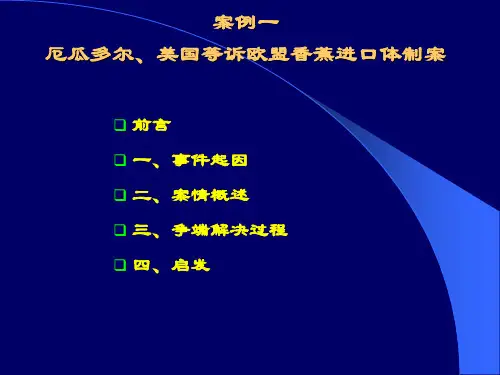
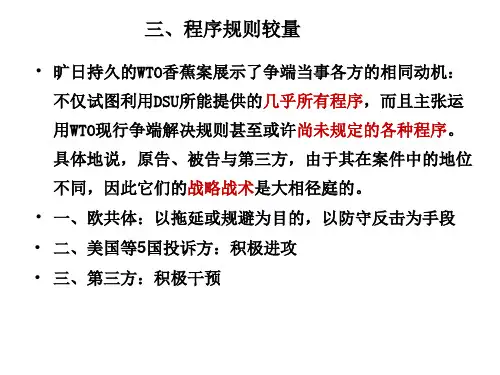
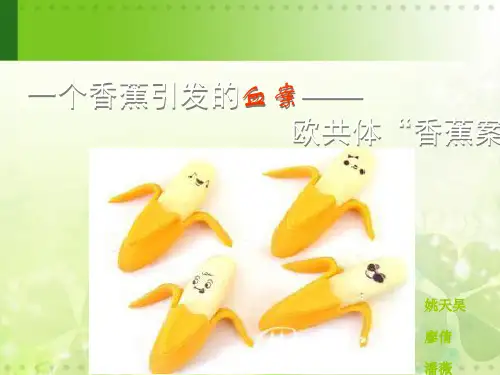
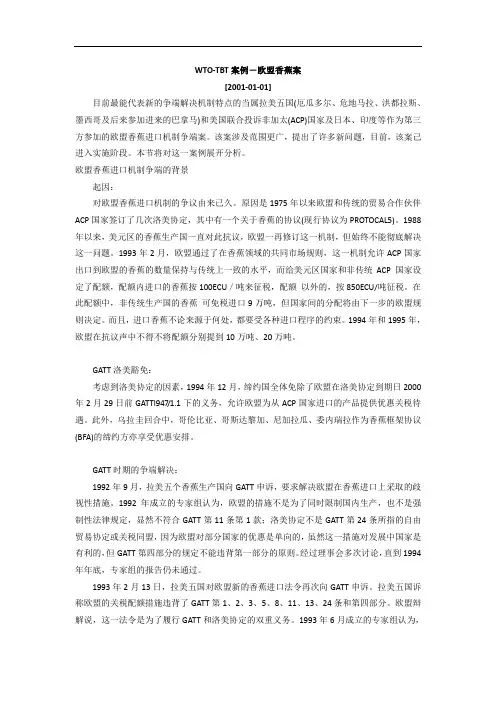
WTO-TBT案例-欧盟香蕉案[2001-01-01]目前最能代表新的争端解决机制特点的当属拉美五国(厄瓜多尔、危地马拉、洪都拉斯、墨西哥及后来参加进来的巴拿马)和美国联合投诉非加太(ACP)国家及日本、印度等作为第三方参加的欧盟香蕉进口机制争端案。
该案涉及范围更广,提出了许多新问题,目前,该案己进入实施阶段。
本节将对这一案例展开分析。
欧盟香蕉进口机制争端的背景起因:对欧盟香蕉进口机制的争议由来已久。
原因是1975年以来欧盟和传统的贸易合作伙伴ACP国家签订了几次洛美协定,其中有一个关于香蕉的协议(现行协议为PROTOCAL5)。
1988年以来,美元区的香蕉生产国一直对此抗议,欧盟一再修订这一机制,但始终不能彻底解决这一问题。
1993年2月,欧盟通过了在香蕉领域的共同市场规则,这一机制允许ACP国家出口到欧盟的香蕉的数量保持与传统上一致的水平,而给美元区国家和非传统ACP 国家设定了配额,配额内进口的香蕉按100ECU/吨来征税,配额以外的,按850ECU/吨征税。
在此配额中,非传统生产国的香蕉可免税进口9万吨,但国家间的分配将由下一步的欧盟规则决定。
而且,进口香蕉不论来源于何处,都要受各种进口程序的约束。
1994年和1995年,欧盟在抗议声中不得不将配额分别提到10万吨、20万吨。
GATT洛美豁免:考虑到洛美协定的因素,1994年12月,缔约国全体免除了欧盟在洛美协定到期日2000年2月29日前GATTl947/1.1下的义务,允许欧盟为从ACP国家进口的产品提供优惠关税待遇。
此外,乌拉圭回合中,哥伦比亚、哥斯达黎加、尼加拉瓜、委内瑞拉作为香蕉框架协议(BFA)的缔约方亦享受优惠安排。
GATT时期的争端解决:1992年9月,拉美五个香蕉生产国向GATT申诉,要求解决欧盟在香蕉进口上采取的歧视性措施。
1992年成立的专家组认为,欧盟的措施不是为了同时限制国内生产,也不是强制性法律规定,显然不符合GATT第11条第1款;洛美协定不是GATT第24条所指的自由贸易协定或关税同盟,因为欧盟对部分国家的优惠是单向的,虽然这一措施对发展中国家是有利的,但GATT第四部分的规定不能违背第一部分的原则。
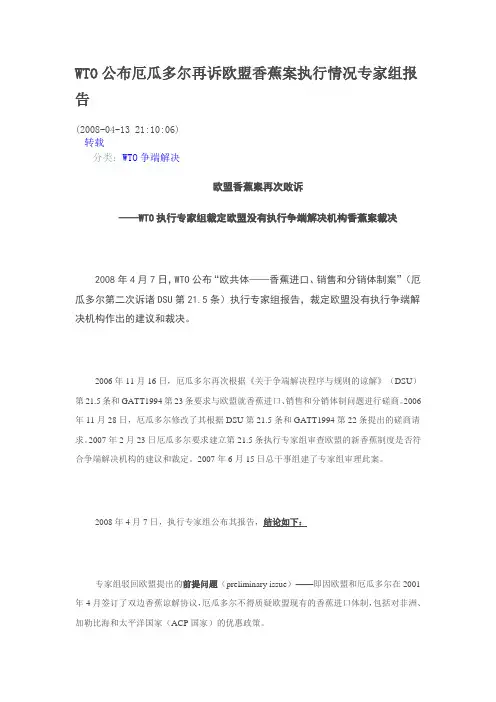
WTO公布厄瓜多尔再诉欧盟香蕉案执行情况专家组报告(2008-04-13 21:10:06)转载分类:WTO争端解决欧盟香蕉案再次败诉——WTO执行专家组裁定欧盟没有执行争端解决机构香蕉案裁决2008年4月7日,WTO公布“欧共体——香蕉进口、销售和分销体制案”(厄瓜多尔第二次诉诸DSU第21.5条)执行专家组报告,裁定欧盟没有执行争端解决机构作出的建议和裁决。
2006年11月16日,厄瓜多尔再次根据《关于争端解决程序与规则的谅解》(DSU)第21.5条和GATT1994第23条要求与欧盟就香蕉进口、销售和分销体制问题进行磋商。
2006年11月28日,厄瓜多尔修改了其根据DSU第21.5条和GATT1994第22条提出的磋商请求。
2007年2月23日厄瓜多尔要求建立第21.5条执行专家组审查欧盟的新香蕉制度是否符合争端解决机构的建议和裁定。
2007年6月15日总干事组建了专家组审理此案。
2008年4月7日,执行专家组公布其报告,结论如下:专家组驳回欧盟提出的前提问题(preliminary issue)——即因欧盟和厄瓜多尔在2001年4月签订了双边香蕉谅解协议,厄瓜多尔不得质疑欧盟现有的香蕉进口体制,包括对非洲、加勒比海和太平洋国家(ACP国家)的优惠政策。
据此在审查厄瓜多尔提出的实质性主张及欧盟援用的辩护意见后,专家组得出以下结论:1.欧盟对原产自ACP国家的香蕉每年授予775,000公吨的零关税配额构成了对此类香蕉的优惠待遇,而这一待遇没有惠及原产地为非ACP国家的WTO成员生产的同类香蕉,因此与GATT1994第1.1条不符;2.“多哈豁免”于2006年1月1日到期,因此没有证据表明自专家组建立之日至此报告之日期间有任何GATT1994第1.1条下的豁免适用于欧盟对原产自ACP国家零关税配额的优惠政策;3.欧盟目前的香蕉进口体制,尤其是为ACP国家保留的优惠关税配额与GATT1994第13.1条、第13.2条引言及第13.2(d)条不符;4.欧盟对最惠国进口香蕉的适用关税设为每公吨176欧元,不考虑考虑在220万公吨配额内的每公吨75欧元的约束关税,这一普通关税超过了欧盟减让表第一部分中设定和规定的税率,因此与GATT1994第2.1(b)条不符。
欧盟香蕉案Banana III : European Communities - Regime for the Importation, Sale and Distribution of Bananas HEADNOTEAB-1997-3, WT/DS27/AB/R, Adopted by Dispute Settlement Body, November 17 1997, Ecuador, European Communities, Guatemala, Honduras, Mexico and the United States, Appellants; Ecuador, European Communities, Guatemala, Honduras, Mexico and the United States, Appellees; Belize, Cameroon, Colombia, Costa Rica, Côte d'Ivoire, Dominica, Dominican Republic, Ghana, Grenada, Jamaica, Japan, Nicaragua, Saint Lucia, St. Vincent and the Grenadines, Senegal, Suriname and V enezuela, Third Participants; Division: Bacchus, Beeby and El-Naggar. IntroductionOn 9 September 1997, the WTO Appellate Body (the “AB”) issued its report on the case European Communities- Regime for the Importation, Sale and Distribution of Bananas1. This is only the last episode of a long battle and the practical result is still to come2. The EC insisted on separate panel reports for each complaining party. The panel accepted, but made identical sections for factual aspects and party’s arguments. Only the findings were different to the extent that the respective submissions differed3. The four panel reports appealed were circulated on 22 May 1997. In those reports, the Panel concluded that the EC import regime for bananas was inconsistent with obligations under Articles I:1, III: 4, and XIII GATT, Articles II and XVII GATS and some provisions of the Licensing Agreement. Both the complaining parties and the EC presented their claims on appeal. Numerous other Members filed their submissions as third participants, belonging to the ACP group4 or to the Members of the Framework Agreement5, as well as Japan. The number of participants and the length of the procedure and of the reports6 are an indication of the importance of the case. Several issues of both General and Trade International Law were1WT/DS27/AB/R. The three members of the AB serving on this case are Mr. J. Bacchus (US) as president, Mr. C. Beeby (New Zealand) and Professor Said El-Nagar (Egypt). It is interesting to note that the president is a national of the US, a Member that has a great interest in the case. This will not be possible at the panel procedure, according to Article 8 DSU, unless the parties agreed.2The EC has been granted a period to implement the ruling of the DSB ending on 1 January 1999.3Therefore, the claims of Guatemala and Honduras were treated together, since those parties filed a joint first submission. This report does not discuss GATS issues, since their initial submission did not allege infringementsof GATS.4ACP States are those African Caribbean and Pacific States which are parties to the Fourth ACP-EC Convention of Lomé (Lomé IV Convention) signed in Lomé, 15 December 1989, as revised by the Agreement signed in Mauritius on 4 November 1995.5This Agreement was signed as a result of the second GATT panel initiated by Colombia, Costa Rica, Guatemala, Nicaragua and Venezuela against the EC banana regime. Guatemala was not a member of the Agreement and therefore appears as a complainant in the present case.6Normally, the AB procedure takes one month. In exceptionally complicated cases, this period may be extended to three months. This period was respected, since the notice of appeal was filed by the EC on 11 June 1997. Each report counts around 400 pages, while the AB report is more than 100.examined and given innovative solutions. The AB is building on the WTO provisions to play its institutional role. The rulings of this initial period furnish the fundamental orientation and principles for the future functioning of the dispute settlement of the Organisation. The analysis is therefore separated in two parts, one relating to the issues of importance for International Law and the second one dealing with International Trade rules.ConclusionsAs a result of the AB it has been confirmed that main aspects of the EC import regime for bananas is inconsistent with WTO rules. The EC will be faced with the obligation of implementing the AB Report, while complying with its commitments under the LoméConvention, namely, giving traditional imports of ACP bananas treatment not less favourable than in the past. This ruling will also encourage the EC to negotiate the next Lomé Convention in a manner which will conform with WTO obligations, according to the different possibilities foreseen by the European Commission in its Green Paper7.The EC regime as it stands today is inconsistent with non-discrimination obligations both under GA TT and under GATS, since it favours imports coming from some regions (EC, DOM and ACP countries and those parties to the Framework Agreement on Bananas) to the expense of other exporting countries. The Commission has proposed the following modifications: To maintain the present tariff quota for non-traditional ACP and third country bananas at 2.2 million tonnes at a duty of 75 ECU/tonne (in stead of 100 ECU/tonne). Additionally, a supplementary quota of 353.000 tonnes at a duty of 300 ECU/tonne would be established to take account of the enlargement.The current licensing system would be dismantled by abolishing Category B licenses and export certificates for FAB countries. This will alter the market conditions. The existing licences are designed to allow cross-subsidies between }mporters of dollar bananas and those of traditional ACP and EC bananas, which are less efficient. To compensate the foreseeable income loss for ACP bananas, the Commission proposes a system of technical and financial assistance, defined for each ACP country8. Another effect is to abolish the FAB modifications to the EC Regime. As before those modifications, all Latin American bananas will be treated in the same way, with the difference that they will not be disadvantaged with respect to ACP bananas. Some of the features of the current system, which do not conflict with WTO obligations, such as the existence of tariff quotas, will be maintained.The overall impact of the reform should benefit the European consumers. Dollar bananas will be available at a lower price and this will influence their choices. ACP bananas will still be accessible, since the quota for traditional imports will probably be maintained, at least until the next Loménegotiation. EC bananas will also maintain their quota.Concerning the operators in the European market, those who are benefiting of Category B licenses are going to loose their quota rent. Since most of them are European based companies, the European operators are the most harmed by this AB ruling. On the contrary, those operators traditionally importing dollar bananas, mainly big transnational companies, will benefit from an7Green Paper on relations between the European Union and the ACP countries on the eve of the 21st century, European Commission, 1997. (http://europa.eu.int)8The use of a system of production subsidies had already been pointed out by the doctrine to minimise the distortionary impact of the internal banana market. See READ R. “The EC Banana Market: The Issues and the Dilemma”, The World Economy, 2(1994), 219-235, at 234.additional income due to the lower import tariff.It remains to be seen whether the producers in the developing countries of the tropical areas will really gain from the reform to be undertaken or if the profit will stay in the trading companies.It is widely acknowledged that the current WTO dispute settlement has moved towards a more rule-oriented system9. The Report in this case contains several innovative conclusions which have a meaning in the definition of the institutional role of the AB. The possibility for private lawyers to represent a Member’s delegation in the AB hearing represents some openness of a purely intergovernmental system. Private lawyers may give a more legally oriented reasoning than government officials. Furthermore, the way in which the AB modifies the reasoning of the Panel in certain points such as the interpretation of the Japan-Alcoholic Beverages case10 reveals a concern for clarity of the legal reasoning, towards a more predictable system. The call for a system of preliminary rulings goes certainly in the same direction. Their impact would depend much on whether they would be admitted as authoritative interpretation or not11.The AB is building up its own identity. As a young institution, it has to provide in its early rulings with principles and guidance that will probably be followed in the future. As in other Reports12, the AB is contributing to the consolidation of the rule of law in the field of international trade.9See YOUNG, M. “Dispute resolution in the Uruguay Round: Lawyers triumph over diplomats”, The International Lawyer, 2(1995) 29 389-409 and MONTAÑÀ I MORA, “A GATT with teeth: Law wins over politics in the resolution of international trade disputes”, 31 Columbia Journal of Transnational Law, 103 (1993), 128-136.10See supra note 错误!未定义书签。
从香蕉案看欧盟和非加太国家的特惠制作者:张晨曦来源:《商情》2012年第26期【摘要】美国、中美洲国家诉欧共体香蕉进口、销售和分销体制案发端于1993年,其贸易纠纷横跨GATT和WTO两个组织,时间之长,影响之深,使之成为最具代表性的贸易纠纷案之一,也使之成为特惠制和自由贸易相摩擦的典型案例之一。
本文以香蕉案为背景,阐述了香蕉案经过,分析了香蕉案中特惠制的特点及其与自由贸易冲突共存之处,最后就特惠贸易体制和多边贸易体制的关系进行了分析。
【关键词】香蕉案,特惠贸易体制,多边贸易体制一、香蕉案简介欧盟是世界上最大的香蕉消费市场,每年约进口香蕉390万吨。
欧盟市场上的香蕉主要有三个来源:一是欧共体内部及直接来自隶属于某些欧盟国家的海外领土,如加勒比地区的英联邦成员,法国的海外省等;二是《洛美协定》受惠国,即非加太地区的部分国家;三是由美国公司跨国投资的中南美洲国家。
1992年,欧盟发布404/93号规则,将呈分割状的欧洲香蕉市场整合为欧共体香蕉共同市场(CMO)。
该规则延续了《洛美协定》对非加太国家的援助义务,实行配额和许可证制度。
1993、94年,中美洲各国因CMO中政策的歧视性,先后诉诸GATT争端解决机制。
而真正的“战争”从1994年“洛美豁免”之后拉开了帷幕。
1995年9月28日,危地马拉、洪都拉斯、墨西哥和美国要求与欧盟磋商,1996年2月5日上述四国和厄瓜多尔联合提出向欧盟的磋商请求。
1996年5月8日,DSB成立专家组,并认为欧盟的许可证制度超出了“洛美豁免”。
欧盟上诉无效,被裁定须在1991年1月1日前执行专家组报告。
1998年7月,欧盟公布修改后的1637/98号规则,但是“香蕉大战”反而越演越烈。
美国竟根据其301条款于1999年3月3日发动“闪电”报复,单方宣布对从欧盟进口的价值约5.2亿美元的近20种产品征收100%惩罚性关税。
欧盟表示强烈不满。
1999年4月第二轮专家组报告认为欧盟新体制仍旧存在缺陷须改进,期限为2000年之前;同时修正对美国造成的损害应为1.914亿美元,美国只可在此数额内被授权报复。
国际市场竞争案例案例一:欧盟与美国农产品贸易的“香蕉战”1、案情简介1975年2月28日,非洲、加勒比海和太平洋地区46个发展中国家(简称非加太地区国家或按英文缩写称为ACP国家),与欧洲经济共同体9国(欧盟前身)在非洲的多哥共和国首都洛美开会,签订贸易和经济协定,全称为《欧洲经济共同体-非洲、加勒比和太平洋地区(国家)洛美协定》,简称“洛美协定”或“洛美公约”。
1993年,欧共体根据《洛美协定》制定了香蕉共同市场政策,诚邀非洲、加勒比海和太平洋的香蕉生产国加入《洛美协定》,允诺以非常优惠的政策从这些国家进口香蕉等产品,即:单方面给予参加国以免税的、稳定的进口配额。
但没有参加该协定的国家则不能享受这些优惠待遇。
这项协定一经公布,立即震动了美洲大陆。
当今世界香蕉出口的40%来自拉丁美洲和加勒比海等地区,其中,来自拉丁美洲生产的香蕉主要是由大庄园雇用工人来进行,这些庄园基本上是由当地大地主和美国跨国公司合作经营。
由于生产规模巨大,资金充足,设备先进,并使用大量杀虫剂和化肥,因而产量高,成本低。
而在加勒比海地区的香蕉主要是由独立小农户生产的,资金少、规模小、成本高、不过化肥和农药用量较少,这些小农户产的香蕉由英国的跨国公司Geest统一收购,然后运往欧洲出售。
欧盟有着世界上最大的香蕉消费市场,每年进口香蕉约390万吨,销售额近60亿美元。
欧盟根据《洛美协定》给同其保持特殊经贸往来的非洲、加勒比海、太平洋地区国家(ACP)以进口分销的优先权。
这种进口分销体制极大地影响了中南美洲香蕉对欧盟的出口,进而影响到美国公司的利益。
尽管《洛美协定》优惠的香蕉进口只占欧洲市场的2%,但美国的香蕉出口公司为了扩展市场,便向美国政府施加压力。
1993年美国正式向英国提出相关交涉,英国以欧盟与ACP签订《洛美协定》为由,拒绝进口中南美洲香蕉。
1995年WTO成立后,美国便与拉丁美洲国家通过WTO指责英国的香蕉贸易存在歧视,因为英国依据《洛美协定》制定的香蕉贸易优惠,实际上是借以限制其他国家的农产品出口,违反了自由贸易原则。
拉美国家与欧盟展开香蕉贸易战2021-10-02 09:44:53 本报综合报道据悉,世界上最主要的香蕉出口国厄瓜多尔,将于本周与欧盟高级官员就未来水果进口关税展开非正式谈判,它强烈反对提高关税。
在世界市场上价值数十亿美元、并对许多拉美国家至关重要的香蕉,是上世纪90年代欧盟输掉的激烈贸易争端的主题。
厄瓜多尔联合美国,说服WTO对欧盟的香蕉制度加以谴责。
欧盟对在非洲、加勒比海和太平洋地区ACP的前殖民地种植者实行优惠。
欧盟随后保证将取消其关税和配额优惠贸易体系,并最迟于2021年逐步实行只适用关税的进口机制。
目前的问题是,单一准入进口关税的水平问题。
厄瓜多尔希望将来欧盟关税不超过当前每公吨75欧元的基准。
厄瓜多尔于6月表示,如果将来关税被设置得太高。
哥伦比亚和洪都拉斯双方均表示希望实行40欧元的关税。
但是,一些非洲生产国,事实上只有象牙海岸和喀麦隆,希望采取更高的关税以保护其香蕉准入欧盟。
ACP部长们约定该集团的目标将是奋力争取275欧元的关税。
ACP的立场同样得到了欧盟内仅有的香蕉生产国法国和西班牙的支持。
法国在其海外领土瓜德罗普岛和马提尼克岛种植香蕉,西班牙则在加纳利群岛种植。
欧盟当前体系包括三个分别独立的配额,共约340万公吨。
ACP国家享有75万公吨的免关税配额,而拉美国家供应商则面临着在剩下配额上支付75欧元的关税。
ACP和拉美生产商声称,正是他们的优惠关税将给工人带来灾难性的后果,并破坏数千人的生计。
“要使拉美国家和ACP的立场相一致非常困难。
双方有着完全不同的观点,你很可能使每个人都感到不满意,”加勒比香蕉出口国联盟执行秘书戈登梅尔斯说,“我们需要实行一种足够高的关税以维持当前产量和价格,关键是维持种植者的生计”。
拉美6个香蕉生产国就欧盟提高关税向世贸组织提出调查申请日期:2005-04-04 比亚《共和国报》消息,3月30日,厄瓜多尔、哥伦比亚、哥斯达黎加、巴拿马、洪都拉斯和危地马拉6国向世贸组织提出申请,要求就欧盟拟将拉美地区香蕉进口关税从目前的75欧元提高到230欧元的措施建议将对拉美地区香蕉产区造成的损害进行调查。